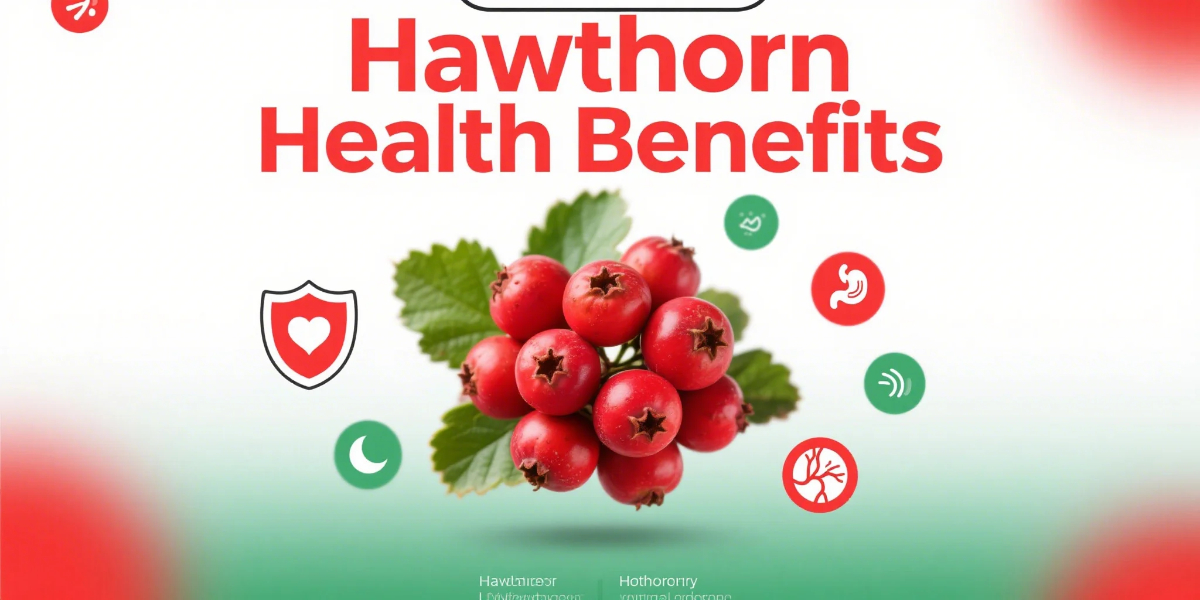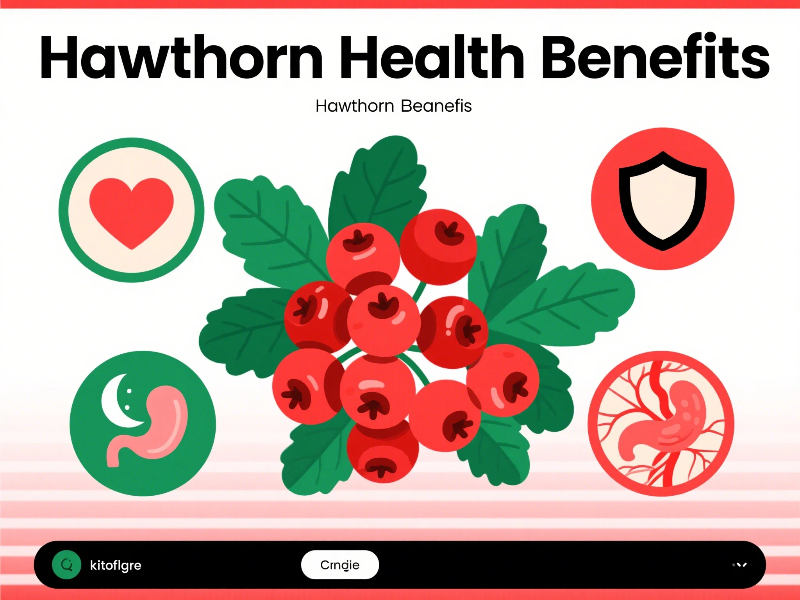Hawthorn Health Benefits & Properties: Nutrients, Uses & What It Doesn’t Cure

The hawthorn health benefits derive from bioactive compounds in its leaves, flowers, and berries—flavonoids, oligomeric proanthocyanidins (OPCs), triterpenoids, vitamins, and minerals support heart and digestive wellness, reduce inflammation and oxidative stress. However, hawthorn does not cure chronic diseases and should not be used as a substitute for professional medical care.
🌿 Nutrients & Phytochemical Properties of Hawthorn
Hawthorn is rich in polyphenols (chlorogenic acid, proanthocyanidin B2, epicatechin), flavonoids (quercetin, rutin, hyperoside), triterpenic acids (ursolic, oleanolic), vitamin C, fiber, amino acids, pectin, essential minerals, and saponins. These contribute to its antioxidant, anti‑inflammatory, digestive and cardiovascular effects.
✅ Key Hawthorn Health Benefits (Evidence-Based Uses)
Cardiovascular Support & Circulation
Hawthorn health benefits include supporting heart function by strengthening cardiac muscle, improving blood flow, dilating vessels, and reducing blood pressure. It helps lower LDL cholesterol, raise HDL, and improve endothelial function—useful in hypertension, angina, and mild heart failure. A Cochrane review found significant benefit as an adjuvant in chronic heart failure symptom control.
Antioxidant & Anti‑Inflammatory Effects
awthorn’s flavonoids and OPCs neutralize free radicals and reduce inflammation linked to cardiovascular disease, arthritis, and digestive disorders.
Digestive Aid & Gut Support
Traditionally used for indigestion, hawthorn stimulates digestive enzymes and bile secretion, relieves bloating and constipation, and acts as a prebiotic via its fiber and pectin content. It may support liver function and accelerate gut motility.
Blood Pressure & Metabolic Regulation
Clinical reports show hawthorn extract (up to 1200 mg/day) can reduce diastolic blood pressure in mild hypertension and improve lipid metabolism. Its flavonoids support blood sugar regulation and reduce triglycerides.
Mild Anxiety Relief & Nervous System Support
Hawthorn contains sedative flavonoids and proanthocyanidins that support relaxation, reduce nervous tension, and improve sleep quality in traditional use.
Skin Health & Wound Healing
Applied topically or via tea, hawthorn can promote skin rejuvenation, reduce inflammation in eczema or psoriasis, and aid minor wound healing due to improved circulation and antioxidant activity.
Emerging Anticancer & Immune Benefits
Initial lab studies show hawthorn extracts may inhibit the growth of cancer cell lines and show mild antimicrobial effects against bacteria. Its polyphenols may also support immune resilience. However, human clinical evidence remains very limited. holistichealthcarewx.
❌ What Hawthorn Does Not Cure
Despite hawthorn’s health benefits, there is no proof that hawthorn cures diseases such as cancer, diabetes, heart disease, Alzheimer’s, or digestive disorders. Hawthorn is not a replacement for prescribed medication, especially for heart conditions. Evidence is moderate and often adjunctive. PubMedVerywell Health
⚠️Safety, Interactions & Usage Guidelines
- Side effects are generally mild: nausea, dizziness, rapid heartbeat. High doses may cause hypotension or arrhythmia. WikipediaVIOLA
- Drug interactions: Hawthorn may interfere with digoxin and certain heart or blood-thinning medications. Consult a provider before use. WikipediaHealth
- Pregnancy & children: Avoid use if you’re pregnant, breastfeeding, or for pediatric use due to lack of safety data.
- Quality: Use standardized extracts and third-party tested supplements.
- Typical dosage: 160–900 mg daily of extract; tea using dried berries/leaves/flowers steeped 10–15 minutes.

📊 Summary Table of Hawthorn Health Benefits
| Benefit Area | Evidence Level | Notes |
|---|---|---|
| Heart & circulation support | Moderate (clinical & meta-analysis) | Hypertension, mild heart failure, angina |
| Antioxidant & anti-inflammatory | Strong (preclinical & some trials) | Free radical & cytokine reduction |
| Digestive aid | Moderate traditional and preclinical | Indigestion, prebiotic support |
| Metabolic & blood sugar support | Preliminary human + animal studies | Triglyceride, LDL, glucose regulation |
| Anxiety/stress relief | Traditional use, limited trials | Mild sedative action |
| Skin healing & topical support | Traditional, limited clinical | Soothing, circulation boosting |
| Anticancer potential | Preclinical lab studies | Not validated in humans |
❓ FAQs
Q1: What are the main hawthorn health benefits?
Predominantly cardiovascular support, antioxidant activity, digestive relief, mild anxiety support, metabolic assistance, and potential antimicrobial effects.
Q2: Can hawthorn cure heart disease or hypertension?
No—while hawthorn may support heart function and reduce blood pressure, it does not cure heart disease and should not replace prescription therapy.
Q3: How is Hawthorn consumed?
Leaves, flowers, or berries are used as tea, tincture, syrup, or standardized extract supplements. Dosage varies between 160–900 mg/day.
Q4: Are there precautions when using hawthorn?
Yes—consult a healthcare provider if you take heart medications or anticoagulants; avoid during pregnancy or if allergic.
Q5: How long does it take to feel the effects?
Benefits such as improved circulation or digestion may take several weeks to become noticeable. Evidence varies individually.
In summary, the scientifically supported hawthorn health benefits include cardiovascular support, improved circulation, antioxidant and anti-inflammatory protection, mild digestive aid, and potential antiarrhythmic effects. Nevertheless, it is not a cure for major diseases. Best used under professional supervision, hawthorn may serve as a complementary component in holistic wellness protocols with recognized medicinal uses based on herbal tradition and modern evidence.
🎯 CTA
Explore trusted hawthorn-based wellness formulas, teas, or tinctures for heart and digestive support. Consult a healthcare provider before starting, particularly if you’re on medications or managing chronic conditions. Learn more by accessing functional food tools and supplement quality guides today.
Related
Discover more from Ecofriendly
Subscribe to get the latest posts sent to your email.

